Cassandra: Greek Goddess Who Foretold Cursed Prophecies
A. Sutherland - AncientPages.com - In Greek mythology, Cassandra was the daughter of King Priam and Queen Hecuba of Troy. She was the most beautiful of Priam's daughters and an inspired prophetess.
Pythia at Delphi, the Sibyls, and even an unfortunate Trojan princess, Cassandra, were regarded as 'brides of the god.'
Cassandra in front of city of Troy. Image credit: E. De Morgan (1898, London) - Public Domain
Apollo's love for Cassandra was so strong that he decided to give her the gift of prophecy, which she wanted to possess so much. With this power, Cassandra could foretell what would happen in the future. In return, he was promised to get her sexual favors, but Cassandra decided to refuse his advances.
She broke her promises, which made Apollo very angry. Unfortunately, he could not take back his gift because divine powers, once granted, might not be revoked. The only thing Apollo could do was make Cassandra's gift without account, so no one ever believed her.
It was god Apollo's only revenge for what she had done to him. Now, Cassandra was cursed by him, and so were her prophecies.
Even when Cassandra stands before the palace in Argos, foretelling her imminent death and that of Agamemnon, no one believes her. The chorus of elders claims they cannot or must not believe her. (Aeschylus' Agamemnon (1072-1330).
Homer's Iliad mentions or alludes to many Greek legends and myths. In the famous epic, Cassandra predicted many tragic events of the Trojan War, a legendary conflict between the early Greeks and the people of Troy in western Anatolia, dated by later Greek authors to the 12th or 13th century BC.
One is related to Priam's son Paris who planned a trip to Sparta. Cassandra warned against this trip, but her warnings were ignored. Each time she told the Trojans what would happen, they would never listen to her warnings.
 Woodcut illustration of Cassandra's prophecy of the fall of Troy (at left) and her death (at right), from an incunable German translation by Heinrich Steinhöwel of Giovanni Boccaccio's De mulieribus claris, printed by Johann Zainer (de) at Ulm ca. 1474. Image: kladcat - CC BY 2.0
Woodcut illustration of Cassandra's prophecy of the fall of Troy (at left) and her death (at right), from an incunable German translation by Heinrich Steinhöwel of Giovanni Boccaccio's De mulieribus claris, printed by Johann Zainer (de) at Ulm ca. 1474. Image: kladcat - CC BY 2.0
Paris traveled to Sparta, where he kidnapped Helen. In Greek mythology, Helen of Troy, also known as Helen of Sparta, was the daughter of Zeus. The abduction of Helen by Paris, Prince of Troy, started the Trojan War with Greece.
Another Cassandra's prediction was also a serious warning. The prophetess predicted Troy's defeat and warned the Trojans not to accept the Greek gift of the Trojan horse, but her prophecy was ignored. Greek troops hid inside the Trojan Horse, which suddenly appeared and captured the city of Troy.
After the Greek victory, Cassandra was given a prize by the Greek leader Agamemnon, the son of King Atreus and Queen Aerope of Mycenae. Later, she returned to Greece with him and their twin boys, Teledamus and Pelops.
However, she also had yet another prediction in her mind. She predicted a terrible fate awaited her and Agamemnon. And so it happened, when they reached Agamemnon's home in Mycenae, they were both killed by Agamemnon's wife, Clytemnestra, and her lover, Aegisthus. Also, their children were killed.
Cassandra was sent to the Elysian Fields after her death because her soul was judged worthy due to her dedication to the gods and her piety during her life.
Cassandra's burial place was believed to be located at Amyclae or Mycenae. The two towns disputed the possession of the prophetess' grave. Heinrich Schliemann, a German archaeologist, considered the modern discoverer of prehistoric Greece, was confident that he found Cassandra's tomb during his excavations at Mycenae. Schliemann found the remains of a woman and two infants in one of the circle's graves at the site.
Written by - A. Sutherland - AncientPages.com Senior Staff Writer
Updated on March 15, 2024
Copyright © AncientPages.com All rights reserved. This material may not be published, broadcast, rewritten or redistributed in whole or part without the express written permission of AncientPages.com
Expand for referencesMore From Ancient Pages
-
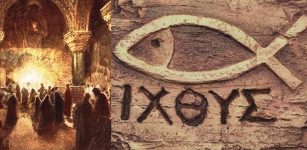 Mysterious Ichthys – Ancient Secret Christian Symbol With A Deep Meaning
Ancient Symbols | Mar 6, 2018
Mysterious Ichthys – Ancient Secret Christian Symbol With A Deep Meaning
Ancient Symbols | Mar 6, 2018 -
 The Gold Compartment At Habu Temple Looks Magnificent After Restoration
Archaeology | Aug 20, 2022
The Gold Compartment At Habu Temple Looks Magnificent After Restoration
Archaeology | Aug 20, 2022 -
 Rock-Hewn Ancient Churches Of Lalibela
Civilizations | Aug 22, 2018
Rock-Hewn Ancient Churches Of Lalibela
Civilizations | Aug 22, 2018 -
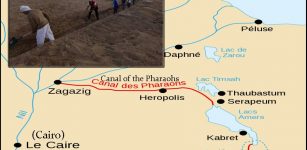 Large Fortress And Wall Uncovered On The Nile Delta Mark Power Of Egypt’s Canal Of the Pharaohs
Archaeology | Dec 29, 2017
Large Fortress And Wall Uncovered On The Nile Delta Mark Power Of Egypt’s Canal Of the Pharaohs
Archaeology | Dec 29, 2017 -
 Remarkable Man-Made Underwater Structures Could Rewrite History Of Wisconsin
Featured Stories | Aug 22, 2018
Remarkable Man-Made Underwater Structures Could Rewrite History Of Wisconsin
Featured Stories | Aug 22, 2018 -
 Herostratic Fame Relates To Herostratus Who Burned The Beautiful Temple Of Artemis To Become Famous
Ancient History Facts | Jan 6, 2017
Herostratic Fame Relates To Herostratus Who Burned The Beautiful Temple Of Artemis To Become Famous
Ancient History Facts | Jan 6, 2017 -
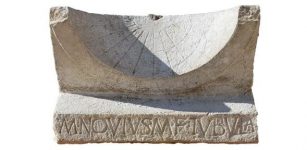 Rare 2,000-Year-Old Intact Sundial With Inscription Discovered In Italy
Archaeology | Nov 9, 2017
Rare 2,000-Year-Old Intact Sundial With Inscription Discovered In Italy
Archaeology | Nov 9, 2017 -
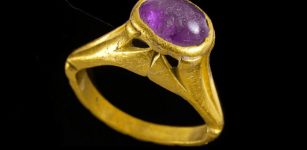 Ancient Greek Amethyst Ring To Ward Off A Hangover Discovered At The World’s Largest Byzantine Wine Factory In Yavne, Israel
Archaeology | Nov 12, 2021
Ancient Greek Amethyst Ring To Ward Off A Hangover Discovered At The World’s Largest Byzantine Wine Factory In Yavne, Israel
Archaeology | Nov 12, 2021 -
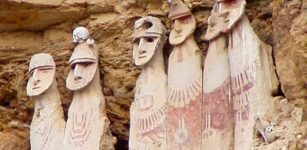 Genetic Evidence Reveals: Chachapoyas “Cloud People” Resistant To Inca Rule
Archaeology | Dec 14, 2017
Genetic Evidence Reveals: Chachapoyas “Cloud People” Resistant To Inca Rule
Archaeology | Dec 14, 2017 -
 Medicine in Antiquity: From Ancient Temples To Roman Logistics
Archaeology | Apr 13, 2018
Medicine in Antiquity: From Ancient Temples To Roman Logistics
Archaeology | Apr 13, 2018 -
 Patara’s 2,400-Year-Old Ancient Kitchen And ‘Women’s Room’ Unearthed
Archaeology | Oct 7, 2020
Patara’s 2,400-Year-Old Ancient Kitchen And ‘Women’s Room’ Unearthed
Archaeology | Oct 7, 2020 -
 Explorer Discovered A Lost Underground World Beneath Big Sur In North America – But Why Cannot Anyone Else Find It Now?
Ancient Mysteries | Feb 12, 2019
Explorer Discovered A Lost Underground World Beneath Big Sur In North America – But Why Cannot Anyone Else Find It Now?
Ancient Mysteries | Feb 12, 2019 -
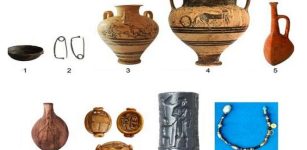 Cyprus’s Copper Deposits Created One Of The Most Important Trade Hubs Of The Bronze Age
Archaeology | Mar 17, 2023
Cyprus’s Copper Deposits Created One Of The Most Important Trade Hubs Of The Bronze Age
Archaeology | Mar 17, 2023 -
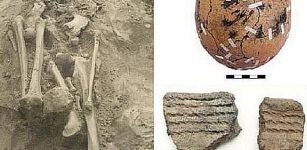 Eastern Baltic’s Communities Of First Farmers And Hunter-Gatherers Merged Slowly
Archaeology | Dec 10, 2023
Eastern Baltic’s Communities Of First Farmers And Hunter-Gatherers Merged Slowly
Archaeology | Dec 10, 2023 -
 Four Magical Treasures Of Tuatha De Danann
Celtic Mythology | Jan 23, 2023
Four Magical Treasures Of Tuatha De Danann
Celtic Mythology | Jan 23, 2023 -
 On This Day In History: Anne Boleyn, The Second Wife Of Henry VIII – Beheaded For Adultery, Treason And Incest – On May 19, 1536
News | May 19, 2016
On This Day In History: Anne Boleyn, The Second Wife Of Henry VIII – Beheaded For Adultery, Treason And Incest – On May 19, 1536
News | May 19, 2016 -
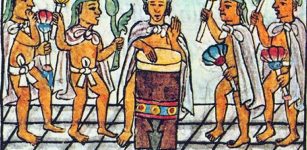 Daily Life Of Télpochcalli Students Of The Aztec Empire Was A Challenge
Ancient History Facts | Apr 20, 2020
Daily Life Of Télpochcalli Students Of The Aztec Empire Was A Challenge
Ancient History Facts | Apr 20, 2020 -
 A Bronze Age Food Vessel Unearthed During A High Street Demolition 42 Years Ago Has Gone On Display At A Nearby Museum
Archaeology | Sep 13, 2022
A Bronze Age Food Vessel Unearthed During A High Street Demolition 42 Years Ago Has Gone On Display At A Nearby Museum
Archaeology | Sep 13, 2022 -
 Evidence The Khufu Channel Aided The Construction Of The Giza Pyramids Found – Scientists Say
Archaeology | Aug 31, 2022
Evidence The Khufu Channel Aided The Construction Of The Giza Pyramids Found – Scientists Say
Archaeology | Aug 31, 2022 -
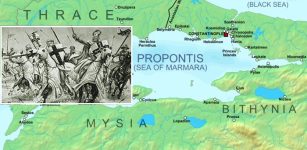 On This Day In History: Battle Of Rhyndacus – Oct 15, 1211
News | Oct 15, 2016
On This Day In History: Battle Of Rhyndacus – Oct 15, 1211
News | Oct 15, 2016

